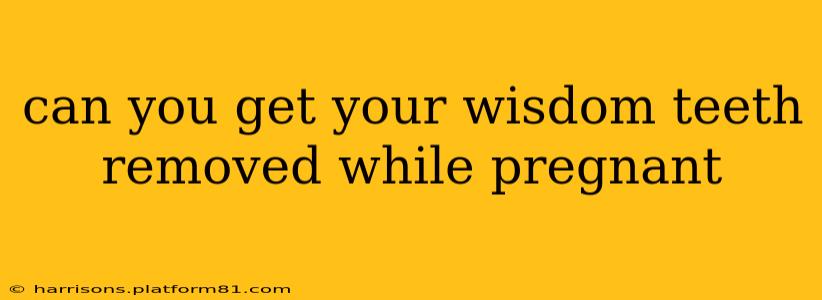Can You Get Your Wisdom Teeth Removed While Pregnant?
The short answer is: generally, no, it's not recommended to have your wisdom teeth removed during pregnancy. While some minor dental procedures might be acceptable, wisdom tooth extraction is considered a more complex procedure with potential risks that outweigh the benefits during pregnancy. Let's delve deeper into why this is the case and explore the relevant considerations.
Why Wisdom Tooth Removal is Usually Postponed During Pregnancy?
Several factors contribute to the recommendation against wisdom tooth removal during pregnancy:
-
Increased Risk of Infection: Pregnancy weakens the immune system, making you more susceptible to infections. The risk of infection following a surgical procedure like wisdom tooth extraction is significantly higher during pregnancy. An infection could potentially harm both the mother and the developing fetus.
-
Medication Restrictions: Many medications used during and after wisdom tooth extraction are not safe for pregnant women or their babies. The limited options for pain management and infection control can make the recovery process more challenging and potentially risky.
-
Stress on the Body: Surgical procedures, even minor ones, put stress on the body. During pregnancy, the body is already working hard to support the developing fetus. Adding the stress of surgery can be detrimental.
-
Changes in Blood Volume and Blood Clotting: Hormonal changes during pregnancy affect blood volume and clotting factors, potentially increasing the risk of excessive bleeding during and after the procedure. This is a serious concern during wisdom tooth extraction.
What are the Alternatives?
If you're experiencing pain or discomfort related to your wisdom teeth during pregnancy, your dentist or oral surgeon will likely recommend conservative management strategies until after delivery. These might include:
- Pain Medication: Your dentist can prescribe safe pain relievers approved for use during pregnancy. Always discuss any medication with your doctor and dentist.
- Antibiotics (if necessary): If an infection develops, appropriate antibiotics will be prescribed, but only after careful consideration of the potential risks and benefits.
- Regular Monitoring: Your dentist will closely monitor the situation to ensure there are no serious complications.
When is it Possible to Have Wisdom Teeth Removed After Pregnancy?
The ideal time to have your wisdom teeth removed is after delivery and after your body has fully recovered from childbirth. This usually means waiting several weeks or months, depending on your individual circumstances and the advice of your doctor and dentist. Your dentist will assess your overall health and oral health before scheduling the procedure.
What if I'm Experiencing Severe Pain During Pregnancy Related to Wisdom Teeth?
If you're experiencing severe pain or other urgent dental issues during pregnancy, consult both your dentist and obstetrician immediately. They will work together to determine the safest course of action, which may involve limited intervention or referral to a specialist.
Can I get a prescription for pain medication during pregnancy?
Yes, but only certain pain relievers are safe during pregnancy. You MUST consult your doctor or dentist before taking any medication, even over-the-counter drugs, while pregnant. They can recommend safe and effective options to manage pain and discomfort.
Is there any risk to the baby if I get my wisdom teeth removed while pregnant?
Yes, there is a risk. The potential risks include infection, exposure to medications that are harmful to the developing fetus, and the stress placed on the mother's body during surgery. These risks generally outweigh the benefits of the procedure during pregnancy.
In conclusion, while there are situations where a dentist might recommend limited intervention during pregnancy, generally, it is best to postpone wisdom tooth extraction until after childbirth. Prioritizing the health of both mother and baby is paramount. Always discuss any dental concerns with your dentist and your obstetrician to make an informed decision.
